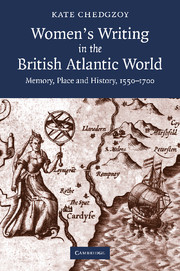Book contents
- Frontmatter
- Contents
- Acknowledgements
- Introduction: ‘A place on the map is also a place in history’
- Chapter 1 ‘The rich Store-house of her memory’: The metaphors and practices of memory work
- Chapter 2 ‘Writing things down has made you forget’: Memory, orality and cultural production
- Chapter 3 Recollecting women from early modern Ireland, Scotland and Wales
- Chapter 4 ‘Shedding teares for England's loss’: Women's writing and the memory of war
- Chapter 5 Atlantic removes, memory's travels
- Conclusion
- Notes
- Bibliography
- Index
Chapter 5 - Atlantic removes, memory's travels
Published online by Cambridge University Press: 22 September 2009
- Frontmatter
- Contents
- Acknowledgements
- Introduction: ‘A place on the map is also a place in history’
- Chapter 1 ‘The rich Store-house of her memory’: The metaphors and practices of memory work
- Chapter 2 ‘Writing things down has made you forget’: Memory, orality and cultural production
- Chapter 3 Recollecting women from early modern Ireland, Scotland and Wales
- Chapter 4 ‘Shedding teares for England's loss’: Women's writing and the memory of war
- Chapter 5 Atlantic removes, memory's travels
- Conclusion
- Notes
- Bibliography
- Index
Summary
The British Atlantic world was ‘made by migration, on both sides of the ocean, and for all members of society’. In the 1630s alone, more than 30,000 people – almost one per cent of the population of England – migrated to the New World. The people who participated in this great movement took their memories of home with them as they travelled, and formed new recollections of the experiences they lived through and the events they witnessed. Conveyed through correspondence, publications, trade, the recollections of returning travellers and the stories of exotic visitors, a new awareness blossomed among people who remained in Britain of the implications of migration and settlement for their changing world. Among the women setting out to make their lives in a new world were the newly wed Anne Bradstreet, discussed in the previous chapter, and four-year-old Mary Rowlandson, joining the radical Protestant exodus to Massachusetts. Some thirty years later, Aphra Behn may also have made the Atlantic crossing, journeying to and from Surinam, the southernmost frontier of the British presence in the Americas. This last chapter is concerned with the Atlantic tales of witnessing and memory told in Mary Rowlandson's The Sovereignty and Goodness of God, Together with the Faithfulness of His Promises Displayed Being a Narrative of the Captivity and Restoration of Mrs Mary Rowlandson and Aphra Behn's Oroonoko, or the Royal Slave.
- Type
- Chapter
- Information
- Women's Writing in the British Atlantic WorldMemory, Place and History, 1550–1700, pp. 168 - 197Publisher: Cambridge University PressPrint publication year: 2007



